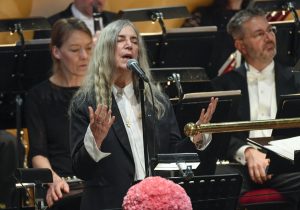Of course he didn’t show. How could he?
I’ve been ten thousand miles in the mouth of a graveyard.
He sent in his stead an early ballad, “A Hard Rain’s A-Gonna Fall,” sung by Patti Smith. The New Yorker called her performance, with full orchestral backing, “transcendent.” Visibly moved, she garbled some lyrics in the second verse:
I saw a black branch with blood that kept drippin’
[Update: Patti Smith reports in the New Yorker that she picked the song.]
Recorded on Dylan’s second album, The Freewheelin’ Bob Dylan (1963), which was his first to feature mostly original songs, Hard Rain had its legendary debut at the Gaslight Cafe in Greenwich Village in 1962, leading the folk singer Dave Van Ronk to name it “the beginning of an artistic revolution.”
Heard the song of a poet who died in the gutter
When Dylan got the Nobel nod back in October, I said that I thought the committee, in this Age of Trumpian and Brexitish Nostalgia, wanted to retrieve and celebrate the “old, weird America” in place of the Orange One’s racist fantasia. The sense that Dylan bears a harsher and truer past seems more intensely pertinent in today’s hard rains. I also think about what Robbie Robertson said about recording the Basement Tapes with Dylan: “He would pull these songs out of nowhere. We didn’t know if he wrote them or if he remembered them.” That’s one task for art: making new things that sound as if they have just crawled out from under ancient stones. He sings a painful, living, entangled past.
I met a young child beside a dead pony
He also sent some words to stand in for his absence at the banquet. Never shy, Bob was thinking about what it felt like to write Hamlet:
I was out on the road when I received this surprising news, and it took me more than a few minutes to properly process it. I began to think about William Shakespeare, the great literary figure. I would reckon he thought of himself as a dramatist. The thought that he was writing literature couldn’t have entered his head. His words were written for the stage. Meant to be spoken not read. When he was writing Hamlet, I’m sure he was thinking about a lot of different things: “Who’re the right actors for these roles?” “How should this be staged?” “Do I really want to set this in Denmark?” His creative vision and ambitions were no doubt at the forefront of his mind, but there were also more mundane matters to consider and deal with. “Is the financing in place?” “Are there enough good seats for my patrons?” “Where am I going to get a human skull?” I would bet that the farthest thing from Shakespeare’s mind was the question “Is this literature?”
Where are you going to get a human skull? What will we do with it now that we have it?
And I’ll tell it and think it and speak it and breath it
In 1963 the Hard Rain was nuclear, but not only. Today’s it’s nativism and racial resentment, but not only.
Bob’s question — “What’ll you do now?” — echoes his dramatist predecessor’s: “that is the question.” Art’s past demands artistic futures.
What will we do now, my darling young ones?

Leave a Reply